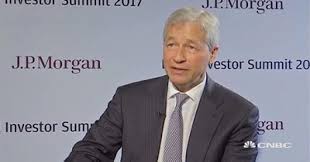Here’s What Most Worries J.P. Morgan CEO Jamie Dimon About the U.S. Economy

On Monday J.P. Morgan Chase (jpm) CEO and chairman Jamie Dimon told CNBC that he saw two major risks to the U.S. economy: the trade war in China and the end of quantitative easing.
In an appearance on Closing Bell, Dimon said that he and other business leaders had told the Trump administration they disagreed with the tactic of raising tariffs on Chinese goods, but the president “obviously doesn’t agree with us.” He said that if the dispute were to escalate to a trade war, it could erase the administration’s progress.
His other concern is the end of the practice by central banks around the world of buying trillions of dollars of government bonds to shore up the economy after the 2008 crisis—known as “quantitative easing,” or QE. Dimon’s worry isn’t so much QE itself, but rather the lack of historical precedent for the current situation: “I don’t want to scare the public, but we’ve never had QE, we’ve never had the reversal… people can panic when things change.”
Dimon knows a thing or two about uncertainty as one of only two still-working bank CEOs who steered their firms through the financial crisis (the other is Lloyd Blankfein of Goldman Sachs (gs), who plans to step down this fall). Still, he has remained generally optimistic about the economy. On a call with analysts earlier this month he citied employment rates, the consumer balance sheet, capital expenditures, household formation, homebuilding, and a healthy banking system as indicators that growth is accelerating.
Dimon’s critique of Trump’s China tariffs aren’t the first time he’s waded into the political arena. In June he weighed in on the Trump administration’s policy of separating children from their parents at the border, saying it was not only cruel but also bad for the economy. There were even rumors that he might run against Trump in 2020, whom he’s said should be a one-term president. Dimon quashed those rumors earlier this year when he indicated his intention to stay at J.P. Morgan Chase for around five more years.



